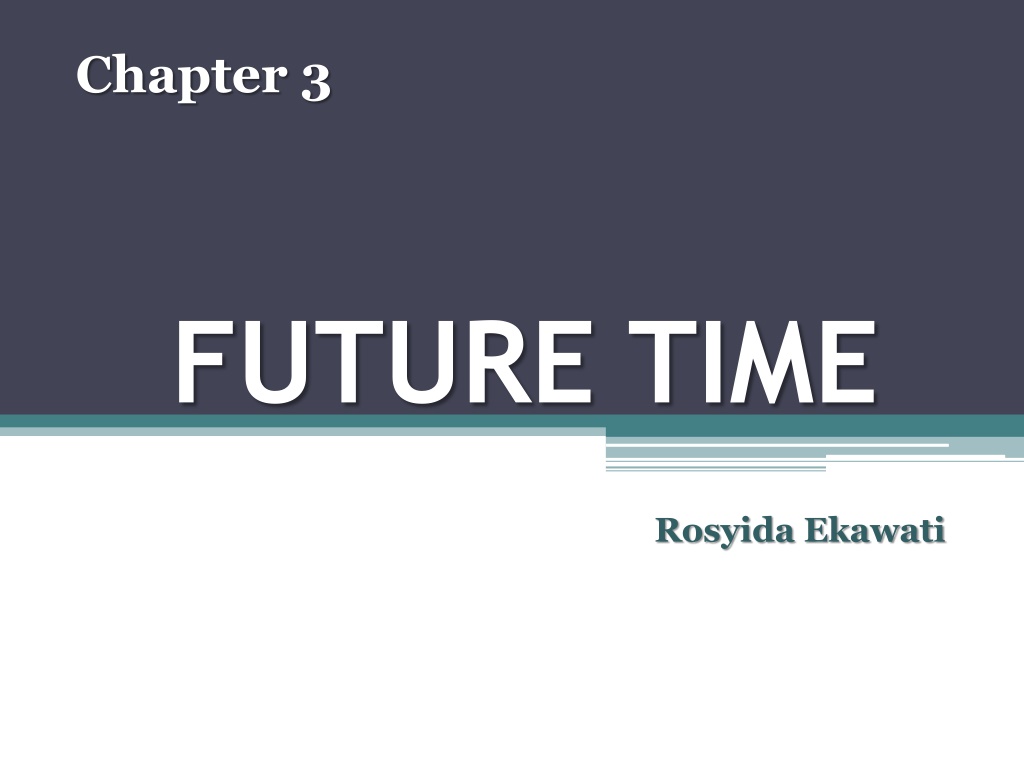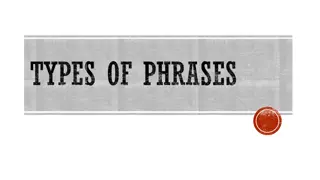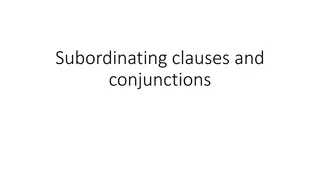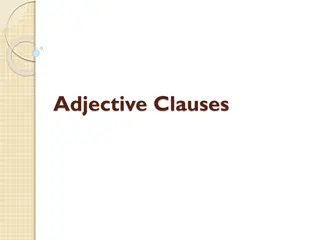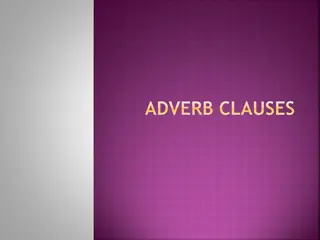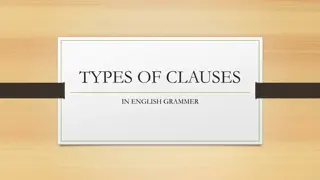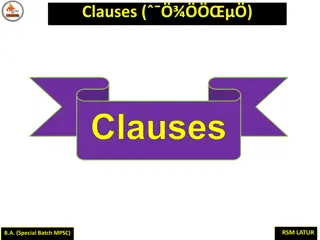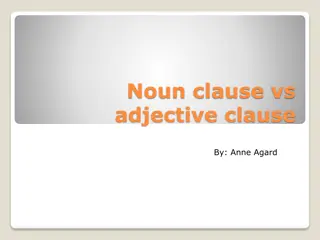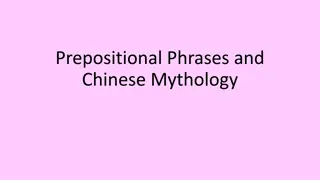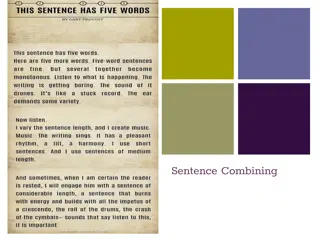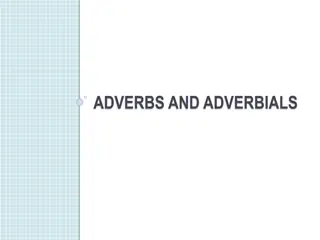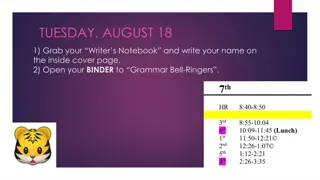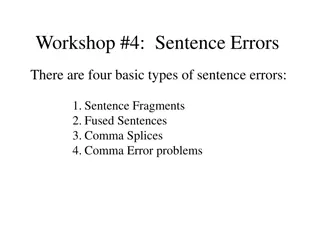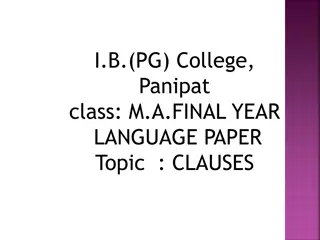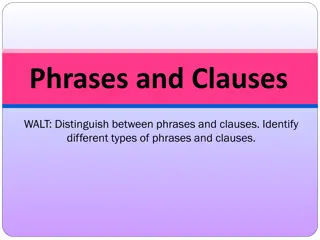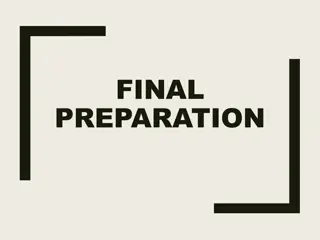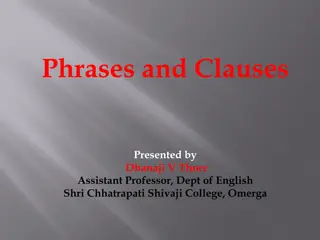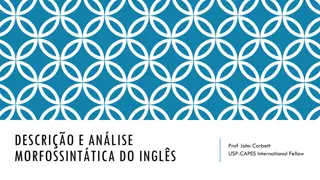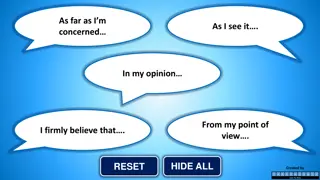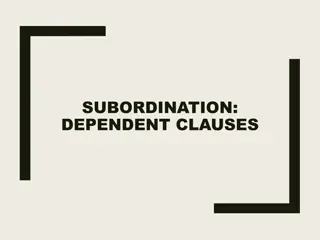Understanding Phrases, Clauses, and Expressing Future in Time Clauses
Learn about the difference between phrases and clauses in sentences. Understand how clauses can be independent or dependent, and how time clauses are used to express future actions. Discover the rules around constructing time clauses and their significance in sentence structure.
Download Presentation

Please find below an Image/Link to download the presentation.
The content on the website is provided AS IS for your information and personal use only. It may not be sold, licensed, or shared on other websites without obtaining consent from the author. Download presentation by click this link. If you encounter any issues during the download, it is possible that the publisher has removed the file from their server.
E N D
Presentation Transcript
Chapter 3 FUTURE TIME Rosyida Ekawati
What is a phrase? What is a clause? What is a time clause?
Sentences contain phrases and clauses. A phrase is a group of words. does not contain a subject and a verb. is not a sentence. e.g. (a) in the park (b) on a rainy day (c) her grandparents in Turkey
A clause is a group of words. contains a subject and a verb. e.g. (d) He went running in the park. (e) She visited her grandparents in Turkey.
Clauses can be independent or dependent. An INDEPENDENT CLAUSE contains the main subject and verb. is the main clause of the sentence. may be a statement or a question. can stand alone.
A DEPENDENT CLAUSE is not a complete sentence. cannot stand alone. must be connected to a main clause.
Expressing the Future in Time Clauses In (a): When Bob comes is a time clause. (a) Bob will come soon. When Bob comes, we will see him. when + subject + verb = a time clause (b) Linda is going to leave soon. Before she leaves, she is going to finish her work. When the meaning of the time clause is future, the SIMPLE PRESENT tense is used. Will or be going to is not used in the time clause.
Expressing the Future in Time Clauses A time clause begins with such words as when, before, after, as soon as, until, and while and includes a subject and a verb. (c) I will get home at 5:30. After I get home, I will eat dinner. (d) The taxi will arrive soon. As soon as it arrives, we'll be able to leave for the airport. The time clause can come either at the beginning of the sentence or in the second part of the sentence: When he comes, we'll see him. OR We'll see him when he comes. (e) They are going to come soon. I'll wait here until they come. Notice: A comma is used when the time clause comes first in a sentence.
Expressing the Future in Time Clauses Sometimes the PRESENT PROGRESSIVE is used in a time clause to express an activity that will be in progress in the future, as in (f). (f) While I am traveling in Europe next year, I'm going to save money by staying in youth hostels. Occasionally, the PRESENT PERFECT is used in a time clause, as in (h). Examples (g) and (h) have the same meaning. The present perfect in the time clause emphasizes the completion of one act before a second act occurs in the future. (g) I will go to bed after I finish my work. (h) I will go to bed after I have finished my work.
Choose the correct verbs of these sentences. 1. After the rain stops/will stop, I am going to wash the car. 2. I'm going to vacuum the inside before I quit/will quit. 3. Are you going to help me before you go/will go to your friend's? 4. My dad cleans/is going to clean the garage after he has/will have lunch. 5. While he is cleaning/will clean the garage later, he listens/is going to listen to podcasts. 6. The garage is/will look great after he finishes/will finish tonight.
Using the Present Progressive and the Simple Present to Express Future Time (a) My wife has an appointment with a doctor. She is seeing Dr. North next Tuesday. The PRESENT PROGRESSIVE may be used to express future time when the idea of the sentence concerns a planned event or definite intention. (b) Sam has already made his plans. He is leaving at noon tomorrow. COMPARE: A verb such as rain is not used in the present progressive to indicate future time because rain is not a planned event. (c) - What are you going to do this afternoon? - After lunch, I am meeting a friend of mine. - We are going to the mall. Would you like to come along? A future meaning for the present progressive tense is indicated either by future time words in the sentence or by the context.
Using the Present Progressive and the Simple Present to Express Future Time The SIMPLE PRESENT can also be used to express future time in a sentence concerning events that are on a definite schedule or timetable. These sentences usually contain future time words. (d) The museum opens at 10:00 tomorrow morning. (e) Classes begin next week. (f) John's plane arrives at 6:05 P.M. next Monday. Only a few verbs are used in this way: e.g., open, close, begin, end, start, finish, arrive, leave, come, return.
Decide the meaning of each italicized verb: in the future, now, or habitually
